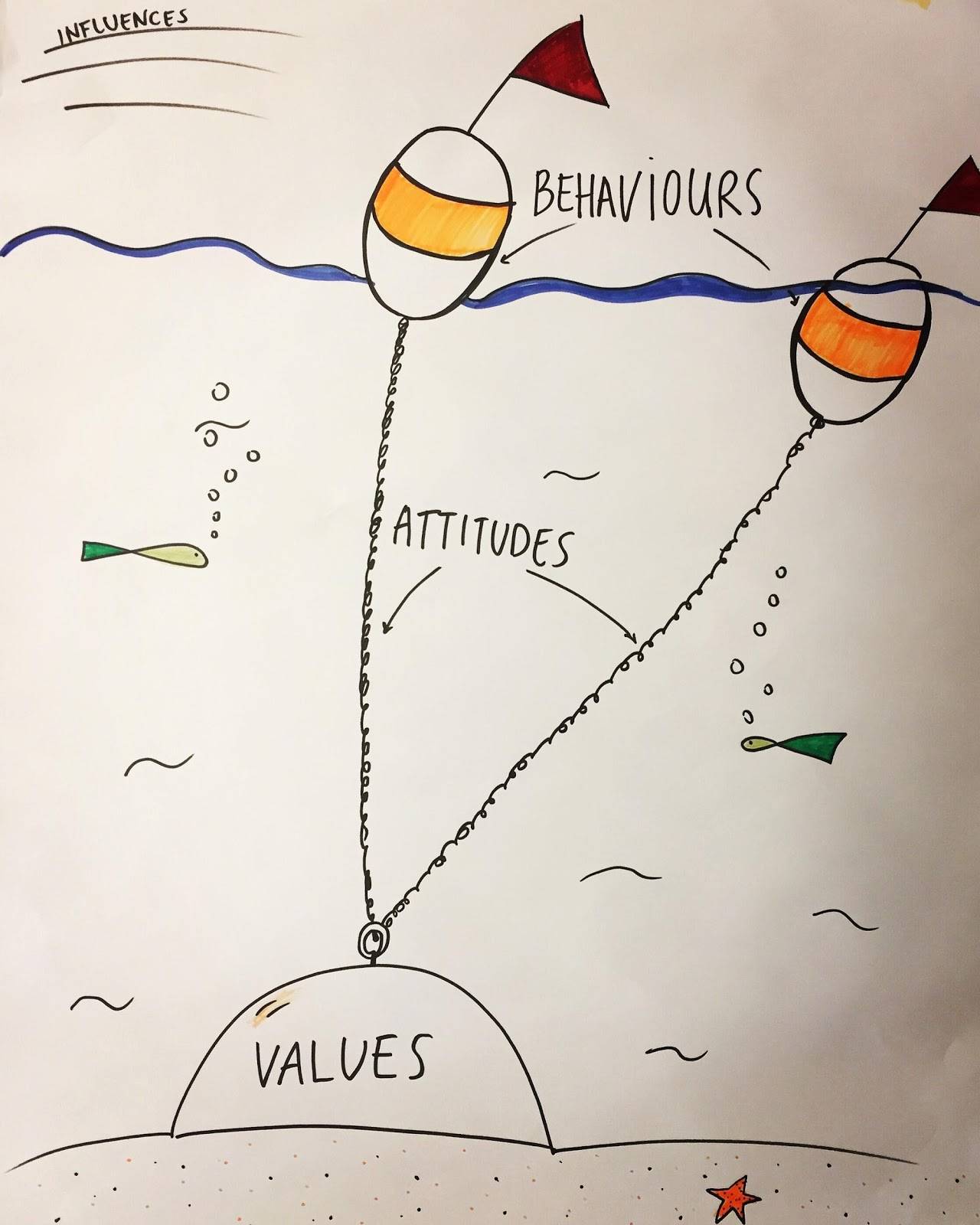Everything we do and decide to act upon is grounded in our conscious or unconscious values, attitudes, norms, and point of view. Values, Attitudes, Behaviours, and Norms are concepts closely linked together. When you are part of any organization, you bring your deeply held values, beliefs, and norms to the organization. They are shown to others in the way you behave and act as well as in the attitude you communicate. These concepts co-mingle with those of the other members to create an organization or family culture.
Values
Values are qualities that are considered worthwhile. They represent your highest priorities and driving forces. Value statements are grounded in values, values guide attitudes that define how people want to behave with each other in an organization, an institution, a company, or a family. Value statements describe actions that are the living enactment of the fundamental values held by most individuals within the organization. They are statements about how the organization will value and act towards, for example, customers, suppliers, and the internal community from e.g HR issues to working hours.
The following are examples of values. You might use these as the starting point for thinking about and articulating them as a human being. Bear in mind that they can be interpreted in different ways for different people. Therefore they are important to clarify and discuss.
Your values are made up of everything that has happened to you in your life and includes influences from your parents and family, your religious affiliation, significant life events, your friends and peers, your education, your workplace, your media use, community, culture, major historical events and more.
Examples of Values
Here are some examples of dominant values. The highlighted words can be interpreted very differently depending on the person and therefore it is important to be clear on the meaning for each person. Also, they can all be values important and unimportant in all categories below.
- Family and friends – caring for each other, family comes first. Responsibility, loyalty, respect, friendliness.
- Workplace – doing your job properly; quality, competence, ambition, flexibility, approving/disapproving of ‘foreign orders’, equality, diversity, respect, compassion.
- Educational institutions – the valuing or otherwise of learning; the value of self in relation to an ability to learn (this often depends on personal experience of schooling, whether positive or negative), collaboration, efficiency, wisdom.
- Significant life events – marriage and the importance and role of marriage and children; separation and divorce and the value change that may be associated with this (valuing of self or otherwise), challenge, honesty.
- Religion—beliefs about ‘right and wrong’ and beliefs in gods, empathy, generosity, optimism.
- Culture—a cultural value such as the importance of individuality as opposed to conforming to groups, teamwork, influence.
ATTITUDEs
Attitudes are collected directions of the value(s) you have on a specific issue. They are predispositions or a tendency to respond positively or negatively towards a certain idea, object, person, or situation. Attitudes have a major effect on how we form for example our thoughts, assumptions, and prejudice towards ourselves and others.
Attitude influences an individual’s choice of action. Our choices of action are responses to challenges, incentives, and rewards (together called stimuli).
Behaviors
The choice of action or how we behave, described above, are the ways in which one acts or conducts oneself, especially towards others. Behaviors are shown through the displayed signals which can be interpreted by the surroundings. How we decide to behave is closely connected to our feelings and needs as well as our perception and thought on a specific situation or action.
Norms
Norms are principles of the right actions for how to be a member of a specific group or culture. Norms bind the members of a group together by serving to guide, control, or regulate proper and acceptable behavior and thought. Stated by Hogg and Vaughan (1998) norms give us access and belonging to, as well as differentiate and shut us out of, specific groups or cultures. Norms have a liable power perspective in which they can differentiate between people. Specific norms can discriminate and in Sweden, we have laws of discrimination. More on that in doc Grounds of Discrimination.
The Buoy Metaphor
As a metaphor, a person’s values could be shown as cemented to the bottom of the sea. A heavy anchor which pretty hard to move. Make a short description of what values are and where they stem from and/or ask the participants. Values are rarely affected and changed due to the fact that they amongst other things, formed our personality during our life. Our values steer our attitudes represented by the chain that connects the anchor to the buoy. Short description of attitudes: attitudes are somewhat changeable, something we can learn to do. Attitudes are not seen, the same with our values, both of these direct the way we behave which the buoy is representing in this model. When we talk we might say -“I don’t like your attitude”, which actually means “the way you are behaving”. Short description of behaviors: behaviors are more obvious than attitudes and values. They can be changed quite easily when being influenced by other perspectives.
Example of a change in behavior:
If you are working in an organization that has a different set of values then yourself you will get influenced by those values. The wind represents the influence of the metaphor. The buoy, your behavior, will change and if the organizational values are contradictory to your own, your buoy might even go underwater. After a while, if you find the values more accurate than your own, you can reconsider both your attitude and your value. Sometimes we can reconsider or even revise our values a bit but usually, we keep the most dominant ones throughout our lives. If you would consider the values of the organization too far from your own and your buoy is “drowning”, you would have to make a change in your environment and/or actions instead. Perhaps you quit your job or you try to affect the values of the company to become more in line with your own.
Why identify and establish your values, attitudes, and behaviors?
Effective people recognize these environmental influences and identify and develop a clear, concise, and meaningful set of values/beliefs, and priorities. Once defined, values impact every aspect of your life.
- You demonstrate and model your values in action in your personal and work behaviors, decision making, contribution, and interpersonal interaction.
- You use your values to make decisions about priorities in your daily work and home life.
- Your goals and life purpose are grounded in your values.
It is important to understand that all individuals have different sets of values and that our own sometimes might be contradictory to another person’s values. It does not necessarily mean that we can’t work together. It is okay to not agree with another person’s value. To become a highly effective team and team members it is important to create safety and trust in the team. What happens when we express ourselves, talk and accept that we are different but still want to work towards the same goal.
Choose the values that are most important to you as a class, the values you believe in and that define your class culture. Then live them visibly every day at work (Hyper Island is a workplace). Living your values is one of the most powerful tools available to you to help you be the person you want to be, to help you accomplish your goals and dreams, and to help you lead others.


